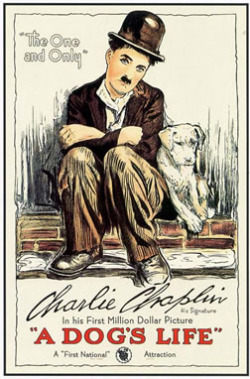 A Dog's Life is one of six Chaplin short films I saw at the recent Janus Films retrospective at the Carolina Theatre in Durham. It's noteworthy for being the first movie that Chaplin directed for First National Films - their contracts with him and Mary Pickford were the first million dollar contracts in film history. Not only that, but it also pairs Chaplin up with a canine co-star, a "thorough-bred mongrel" named Scraps according to the title cards. All in all, it's one of the more enjoyable shorts I saw, and contains several of the dominant themes that characterized Chaplin's work.
A Dog's Life is one of six Chaplin short films I saw at the recent Janus Films retrospective at the Carolina Theatre in Durham. It's noteworthy for being the first movie that Chaplin directed for First National Films - their contracts with him and Mary Pickford were the first million dollar contracts in film history. Not only that, but it also pairs Chaplin up with a canine co-star, a "thorough-bred mongrel" named Scraps according to the title cards. All in all, it's one of the more enjoyable shorts I saw, and contains several of the dominant themes that characterized Chaplin's work.
The film opens with Chaplin as his famous Tramp character, sleeping in the dirt behind a fenced-in area. He awakens to find a food salesman on the other side of the fence with a bucket full of tasty meat. But just as he's reaching through the fence to steal some breakfast, he's spotted by a police officer. This leads to a humorous back-and-forth chase scene that touched on a common theme in Chaplin's work: the police not as protectors of society but as obstacles to lower-class survival. It's no wonder that his films were so popular among immigrants and the working class. Not only could his silent comedy transcend the language barrier, but his Tramp character was someone many could relate to. The United States was still in the middle of a wartime economy, not having yet reached the Roaring Twenties, and Tramp in many ways provided an outlet for lower-class frustration. In A Dog's Life, Tramp doesn't even remotely pretend to be a gentleman, as he does in other Chaplin films. He's mangy, dirty and ragged. A swift kick in the pants of a police officer not only allowed audiences to laugh at authority figures, but it captured the class tension many people dealt with every day.